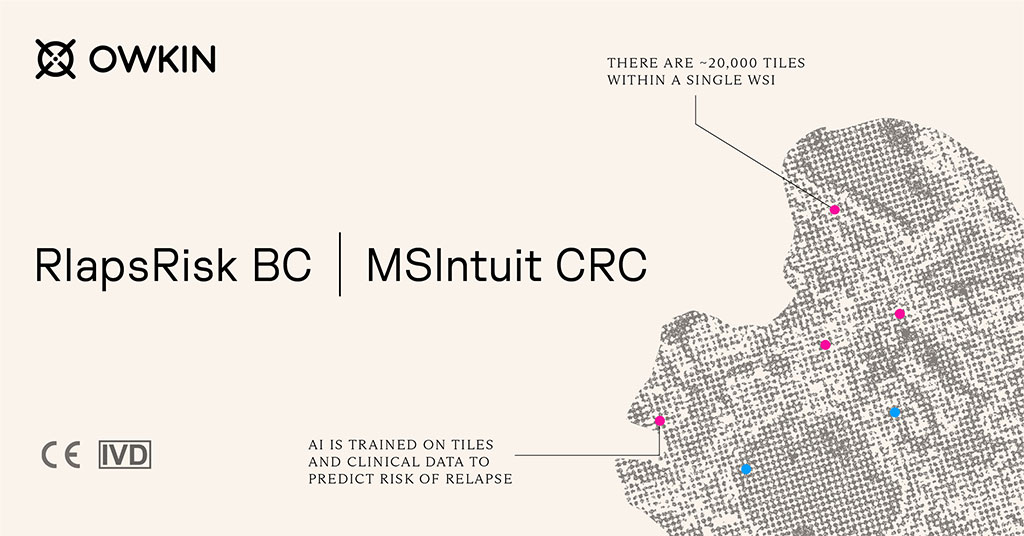First-in-Class AI Diagnostic Solutions Improve Patient Outcomes in Breast Cancer and Colorectal Cancer
Posted on 06 Sep 2022
Two first-in-class rapid, affordable AI-based diagnostic solutions that are designed to improve outcomes for patients with breast cancer and colorectal cancer have been approved for use in Europe. By using AI to analyze digital pathology images, they are designed to help clinicians make precision medicine – diagnostic and treatment based on a patient's individual characteristics – more accessible to more patients at an earlier stage of their disease.
Owkin Dx RlapsRisk BC and Owkin Dx MSIntuit CRC from Owkin (New York, NY, USA) have received CE-IVD approval for diagnostic use in the European Union. RlapsRisk BC is the first CE-IVD approved digital pathology-based AI diagnostic that predicts the risk that early breast cancer patients will relapse. MSIntuit CRC is the first CE-IVD approved AI solution that enables the identification of microsatellite stable (MSS) patients from routine histology slides, enabling a significant reduction in time and the number of diagnostic tests for detecting MSI in clinical practice.

RlapsRisk BC is an AI prognostic solution that predicts whether a breast cancer patient (ER+/HER2-) will go on to relapse after treatment, informing oncologists which high-risk patients may benefit from targeted therapies and which low-risk patients could potentially avoid chemotherapy. The solution aims to revolutionize breast cancer care management by using AI to assess the risk of relapse after treatment from digital images of tissue samples. Currently, breast cancer patients at risk of relapse are identified through expensive, time-consuming molecular or genetic testing. RlapsRisk BC offers doctors a way to identify patients at risk of relapsing by using AI on digital pathology data that will already be held on nearly all breast cancer patients in around 15 minutes.
MSIntuit CRC is an AI digital pathology diagnostic solution that pre-screens for a biomarker in colorectal cancer tumors known as microsatellite instability (MSI) – a defect in a cell’s ability to correct mistakes that occur when DNA is copied. The diagnostic solution rules out MSS phenotypes, allowing pathologists to concentrate their resources on confirming those patients who exhibit MSI. By using an AI model to analyze digital images of tissue samples, doctors are able to more efficiently screen patients when compared to standard testing techniques, which include time and patient tissue sample-consuming polymerase chain reaction (PCR) testing or immunohistochemistry.
“Owkin's RlapsRisk BC enables pathologists to provide oncologists and patients with insights on the risk of relapse, crucial information for the treatment decision-making to avoid unnecessary chemotherapy. Thanks to RlapsRisk, HER2-, ER+ patients will benefit from an automated and accurate prognosis test using just a simple, standard-stained tumor slide,” said Dr. Magali Lacroix-Triki, MD, PhD, an expert breast pathologist at the Department of Medical Biology and Pathology, Institut Gustave Roussy. “AI-based digital pathology diagnostics could help us to provide a comprehensive analysis of each tumor from just one representative standard-stained tumor slide, in a complementary process to the pathologist’ diagnosis. This would democratize access to precision medicine, unlocking a new era of treatment for patients across the world.”
“As colorectal cancer is the third most common cancer in the world, it is crucial that we are able to screen patients for biomarkers that make them eligible for potentially lifesaving treatments. dMMR/MSI screening should be performed on all colorectal cancer patients, but pathologists' time and resources are often too stretched,” said Professor Magali Svrcek, MD, PhD, Sorbonne Université, AP-HP, Saint-Antoine Hospital, Department of Pathology. “Owkin's new AI diagnostic solution MSIntuit CRC will roughly half the number of cases requiring screening. It is designed to help more patients receive treatment sooner. AI-based digital pathology algorithms like these, developed in consultation with pathologists, will soon become an integral part of our daily practice. They will help patients to benefit from the best treatment for them sooner – a new era of personalized medicine.”
Related Links:
Owkin











 (3) (1).png)


